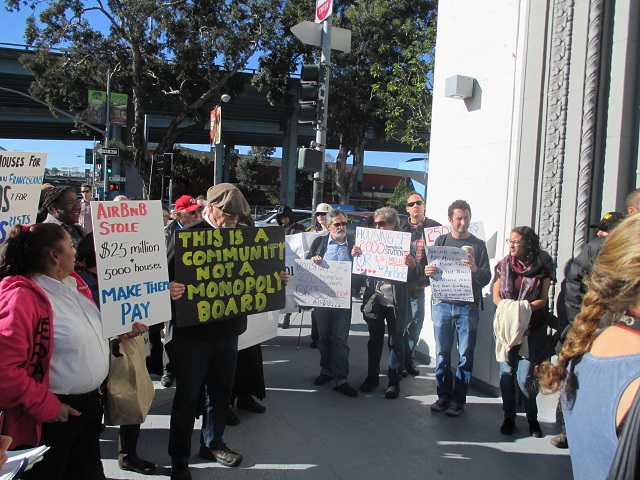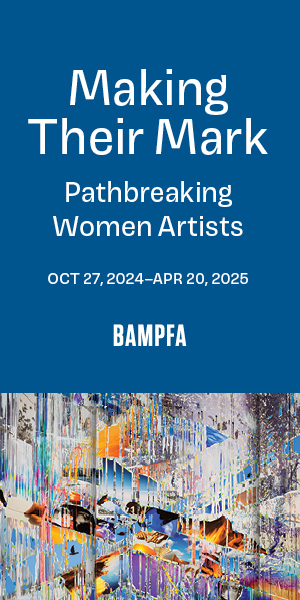Airbnb’s taxes, ballot initiatives, why are city officials not telling us who they are meeting with, ethics reform, and spaghetti for the 99 percent

By Tim Redmond
FEBRUARY 17, 2014 – The private schools all seem to have this week off (it’s called “ski week,” although there’s not a lot of snow in California – or in France, so don’t go there!), and with the Lunar New Year, Presidents Day, and the public schools closed Thursday and Friday, it’s not a big week for political meetings. No Board of Supes meeting this week, and most committees are also idle. The Planning Commission isn’t meeting Thursday.
So that gives us a chance to talk a little about legislation that’s been introduced in the past few weeks and will be headed for committee hearings in late Feb. or early March.
But first a minor item that came up last week and is headed for the Government Audit and Oversight Committee: File Number 150109 got no attention, and will no doubt be unanimously approved, the way these things are. But let me mention it anyway:
“Settlement of unlitigated claim, Zendesk Inc., $239,467.36”
In the scheme of things, not much money at all. The city settles much larger claims almost every week. We don’t know much about it; the City Attorney’s Office can’t comment, and neither can the Treasurer’s Office, which is proposing the settlement.
That’s because it’s a tax claim: In essence, Zendesk is saying the city charged it $239,000 too much in taxes. Taxpayer info. is all strictly confidential under state law, so nobody can tell me what the claim is about, what type of taxes are involved, or whether there’s a case that the city didn’t do anything wrong.
Okay, fine. But Zendesk is one of the companies that benefitted (to the tune of a lot more than $239,000) from the Twitter Tax Break. And now the feel-good company is complaining?
Speaking of taxes and tech companies, The Land Use and Economic Development Committee is going to hear the legislation by Sup. David Campos on Airbnb taxes sometime in the next few weeks. Campos wants to suspend the new short-term rental law – the one that legalizes turning apartments and houses into hotel rooms anywhere in the city – until the Treasurer certifies that all of the companies in the STR business have paid all the back taxes they owe.
Two of the three Committee members have already voted against this; Sups. Malia Cohen and Scott Wiener were among those who shot down the idea when Campos proposed it as an amendment to the original Airbnb bill. So it won’t get a positive recommendation from the panel. But the full board vote isn’t as clear.
But Campos got five votes that time around, and now the local Democratic Party has now endorsed the idea, and there’s a new supervisor in District 3. If Julie Christensen sides with Campos, he’ll have a majority.
It will be one of the first defining votes for Christensen, who is an ally of Mayor Ed Lee but could also be facing a serious challenge this fall is, as expected, former Sup. Aaron Peskin runs against her. Peskin, it’s safe to say, supports making Airbnb pay its back taxes.
And in fact, even Lee told reporters last week that he thinks “all companies should pay their taxes.” We shall see.
Campos has also introduced, along with Sup. Jane Kim, a new version of his law increasing the payments for tenants evicted under the Ellis Act. The previous bill wound up in federal court thanks to a right-wing property-rights law firm, and a federal just overturned it. The new measure requires tenants who receive payments to spend the money on housing and caps payments at $50,000. The original bill won eight votes.
Sups. Eric Mar and John Avalos have a sleeper that could create some furor: They want to require that all city officials keep daily calendars of their events – and that those calendars include information about “the identities of the people” attending.
Here’s why this is relevant: A couple of weeks before the mayor appointed Sup. Christensen, I asked, under the Sunshine Ordinance, for copies of the mayor’s schedule showing any meetings to discuss or consider appointments to the Board of Supervisors. I just wanted to know who the mayor was interviewing for the job.
The Mayor’s Office quickly sent over his calendar, and there were six times when he held meetings to discuss “commissions and appointments.” Nice to know, but that’s all the calendar said. I followed up by asking for the names of the people who attended those six meetings. Here’s what the office of the chief executive of San Francisco told me:
“This office does not have any responsive records.”
In other words, nobody in the Mayor’s Office has any records at all showing who was invited to meet with Mayor Lee, or who attended those meetings. You really believe that?
So who is going to vote against the idea of requiring public officials to tell us who they meet with? Watch and see; I promise the mayor will oppose this.
Wiener is promoting legislation that would change the requirements for local ballot initiatives. He wants to require a hearing before anyone begins to circulate petitions, and wants to raise the number of signatures required. There will be serious opposition, and not just from the Left; lots of San Franciscans treasure the right to (fairly easily) put a measure on the ballot.
Jon Golinger makes the case against the measure in the Ex. I think a lot of people are going to ask why we need this in the first place; it’s not as if we are facing a flood of pointless, worthless, or money-driven ballot measures.
Okay, this is a little bit self-promoting, but only a tiny bit, and the really cool parts don’t involve me:
The Unitarian Universalists for Peace and Justice, and the 99 Percent Coalition, are holding a spaghetti dinner and program Feb. 28 featuring John Powell, UC Berkeley professor of Law, African American Studies and Ethnic Studies, and former Assemblymember Tom Ammiano. Powell is really amazing; I spoke with him a couple of weeks ago, and his analysis of the economy, labor, and race is brilliant. Ammiano, of course, is a fabulous speaker (and my partner in the Tom and Tim Show!)
I am getting an award, along with Gloria La Riva, Nadia Kayyali and Larry Danos. Don’t come to listen to me. Powell and Ammiano are easily worth the $20. 6pm, Unitarian Church, 1187 Franklin, SF.
The Ethics Commission, which (weakly) enforces the city’s campaign finance laws, meets Feb. 23, and Friends of Ethics is pushing the panel to adopt some new rules that will close glaring loopholes – and could impact the November elections.
Among the proposals from the watchdog group, which I once described as a “fractious group of organizers and shit-disturbers who don’t always get along or agree on other issues,” are provisions to ban campaign contributions to local officials from people who are seeking land-use approvals (beyond a modest financial threshold) and a prohibition on contributions from lobbyists and those who would receive a benefit from a city action.
The group also wants to stop the practice of shifting campaign money from the unlimited funds of a Democratic County Central Committee campaign to a campaign for another local office.
The agenda for the meeting isn’t set yet, but you can find it at sfethics.org. Meanwhile, if you want to support the FOE suggestions, you can write to the commission chair, Ben Hur, at SF Ethics Commission, 25 Van Ness Avenue, suite 220, San Francisco, CA 94102. Nah, I don’t have an email for him. How old fashioned.
You want to read a long letter from Larry Bush on behalf of FOE, here it is:
Dear President Hur:
The Friends of Ethics appreciates the continued outreach from your staff to solicit our views on the upcoming Commission meeting.
At the last Commission meeting, we understood that the Commission intends to address the issues Friends of Ethics and others have raised regarding changes to the CFRO. Our purpose in proposing additional reforms is to assist the Commission in its stated Mission of “Creating reform within the political process to ensure fair and equitable consideration to public policy issues.”
Our proposals dealt with both the policy side of the Commission’s work and the practices of how the Commission undertakes its work.
It needs to be noted that nearly all the proposals we made have been presented to the Commission repeatedly over the past three years, including in a report from the Board Budget Analyst, in two San Francisco Civil Grand Jury reports, in a number of Interested Persons meetings and in correspondence and testimony before the Ethics Commission. They have been subject to repeated deliberations by the Commission but no further action.
While we continue to urge the Commission to fully respond to each of the issues we have raised, in response to staff requests we now are writing to highlight those items that we believe can be implemented in the short time frame available before the 2015 election cycle and the budget cycle are beyond reach.
Friends of Ethics strongly supports a budget augmentation to fund a Commission Secretary on at least a part time basis. The Commission minutes indicate a number of times when the Commission has directed staff to either draft legislative proposals or return to the Commission with further information but where nothing has happened:
- In November 2012, the Commission adopted a new disclosure law applying to “Draft Committees” supporting a named potential candidate who has not filed. At the January meeting, the Commission was informed that this did not move forward because no Board sponsor was identified. This response ignores the fact that the Commission itself could have placed this measure on the ballot. The minutes do not reflect that any of this information or option was presented to the Commission. It is just such follow-up that a Commission Secretary can provide.
- In May 2013, the Commission directed that staff draft legislation to increase the blackout period for contributor contributions from six months to 12 months. There is no record that the requested draft legislation ever returned to the Commission.
- In May 2013, the Commission directed that staff should review legislation then pending at the Board to amend the lobbyist ordinance for a change that would ban lobbyist contributions. The ordinance underwent revisions, was passed and signed into law, but staff has not returned to the Commission with any response.
- There are more examples from the May 2013 Commission meeting of requests to staff to monitor developments and return to the Commission with proposed actions. While all the pending issues were resolved more than a year ago, there has been no follow through by the staff in public commission meetings.
- The charter requires that the Commission acknowledge to any person filing a complaint under the Commission’s jurisdiction that the complaint was received, what action is underway, and then what the final action was. There have been repeated statements to the Commission that this charter requirement is not being met. A Commission Secretary could handle these communications as a regular duty.
- The Commission has asked for regular updates on state and federal law changes that affect the Commission’s duties and options. To date there has been no report from staff to the Commission on any developments. A Commission Secretary would assist the Commission in being knowledgeable about changes in laws that affect the Commission.
Friends of Ethics also continues to support a budget that includes any necessary augmentations for making Ethics information available in languages other than English, in creating searchable databases for travel, behest, contract, gift and contribution filings, and to work with the FPPC on Form 700 forms to ensure they can be searched, aggregated and compared.
Policy Recommendations:
- Establish a private right of action that includes receiving an amount of the judgment recovered. The Ethics staff compared the San Francisco and Los Angeles private right of action in its memo to the Commission for the May 2013 meeting but omitted mention of the Los Angeles provision that provides a private plaintiff with 50 percent of the amount recovered (LA Campaign Finance Ordinance, Sec. 49.7.38 (B)(4). Friends of Ethics believe stronger enforcement will take place if a version of the Los Angeles model is adopted in San Francisco that requires notification to the enforcement authorities, a failure to act after a specified time, a threshold for violations, and 50% sharing in the penalties owed as done in LA.
- San Francisco should amend its enforcement provisions to include a penalty of debarment modeled on the Los Angeles law, which states that a person who violated or to have aided or abetted a violation “shall not be eligible to bid on or be considered for a contract, extension or amendment” and applies it to an entity that has the same or similar management, ownership, or principal employees.” This is a greater deterrent that a fine.
- San Francisco should prohibit contributions from parties “who seek land use-related approvals that exceed a certain threshold monetary amount,” a recommendation suggested by Ethics staff to “explore” in its May 2013 memo. Notably, voters overwhelmingly approved in 2000 a measure that went further, dealing with franchises, tax abatement, permits, and variances, and covering campaign contributions, gifts and other benefits. This voter-approved provision was removed in 2003 in a major rewrite of Ethics laws that failed to mention that the effect would be to eliminate this provision. While Ethics staff has maintained that the 2003 language was approved by the Ethics Commission and the Board, Friends of Ethics includes former Ethics Commissioners and Supervisors who cast votes for the 2003 measure and who confirm that they were never informed that this provision would be eliminated. This falls far short of the transparent government that voters expect in general, much less from the Ethics Commission, and, except for the length of time since it took place, could well generate calls for an investigation into the staff’s actions that essentially misled the commission, the Board and the voters. (See SF Civil Grand Jury Ethics Report, June 2014). Friends of Ethic strongly recommend that this language, consistent with subsequent court decisions, be re-enacted immediately.
- Friends of Ethics also calls for a prohibition on contributions, gifts or behest payments from any person or entity, officers or owners of any entity, or agents of the entity that is subject to enforcement actions .Enforcement actions would include the initiation of criminal, civil, or administrative action. The prohibition on contributions, gifts, and payments would apply to an elected official who (a) has direct or indirect authority over the agency instituting the action (example: the DA in the case of a criminal prosecution; the City Attorney in the case of a civil law suit; the Mayor in the case of a department instituting an administrative proceeding) or (b) has appointed a majority of a Board with oversight of the enforcement action. The prohibition would last for the period of the enforcement action and a year following its termination
- A prohibition on contributions or fundraising from lobbyists and those who receive a benefit from a proposed city action, similar to proposals in the American Anti-Corruption Act proposed by Trevor Potter, as well as a prohibition on fundraising by city commissioners and department heads for any candidate other than themselves. This is modeled on the Los Angeles law (see Board Budget Analyst Report, 2012).
- Designate the Ethics Commission as the sole Filing Officer for Behest Statements, to end the practice of having Officials filing with their own office and to enable the Commission to issue late fees for untimely disclosures.
In addition, Behest statements should be expanded to provide additional disclosure beyond the minimum requirements of state law, such as information about pending business activity that the person or entity making the payment has before the City.
- Amend CFRO Section 1.122(c) to permit transfers to and from controlled committees only if the committees were formed for the same City elective office. This reform is needed both to preserve the intent of campaign contributors and maintain the integrity of contribution limits. The latter are undermined when transfers to City office committees are permitted by, for example, County Central Committee candidate committees, which may receive unlimited donations and corporate contributions. The current attribution rules for transfers are inadequate for safeguarding the policy objectives of contribution limits on candidate committees.
We look forward to the Commission’s review and consideration of our proposals, and hope that the result will be to strengthen protection of citizens against the corrupt influence of pay-to-play politics.


